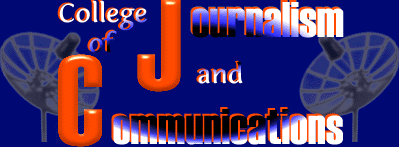


|
|
|
|
|
|
|
|
|
|
|
 |
 |
 |
|||||||
|
|
|
|
|
|
|
|
|||
|
|
|
|
|||||||
|

History and OverviewSpecial Features The College of Journalism and Communications began as a Department of Journalism in 1925. In 1949, the department grew into a School of Journalism and Communications under the leadership of Rae O. Weimer, who joined UF as the school's director. In 1967, the school became a college with Weimer as its first dean. Departments of advertising, broadcasting, journalism and public relations were organized in 1972 under the guidance of John Paul Jones, Jr., who served as dean from 1968-76. Ralph L. Lowenstein served as dean from 1976-94. Lowenstein supervised the construction of Weimer Hall and its opening in 1980 as well as the Flanagan Wing addition in 1990. During the Lowenstein era, the college became one of the nation's most prestigious programs in journalism and communications. The college facilities are considered among the best in the nation. Dean Terry Hynes succeeded Lowenstein in 1994. Under her leadership the college continues to gain national stature. Hynes has continued the long-time college commitment to combine conceptual instruction with practical application. The college has maintained its cutting edge in the study of journalism and communications and in use of new communication technologies. Students in the college rank among the nation's best. In national competitions, telecommunication students have won the Hearst Broadcast News competition four of the last twelve years; journalism students have won 14 national writing and photo championships; public relations students have won the Bateman Case Study Competition seven times in the last 18 years; and advertising students have won the national AEJMC logo competition six times in the last fourteen years. Today, the College of Journalism and Communications provides accredited curricula leading to bachelor's degrees in four disciplines: advertising, journalism, public relations and telecommunication. The college also offers programs leading to the master's degree and Ph.D. degree in mass communication and joint M.A./Juris Doctor and Ph.D./Juris Doctor degrees. Programs of the college are accredited by the Accrediting Council on Education in Journalism and Mass Communications. The curricula, faculty, facilities and alumni are evaluated regularly by the ACEJMC. The academic divisions of the college are as follows:
Special Features:The college includes the PBS affiliate (WUFT-TV) and NPR affiliates (WUFT-FM, WJUF-FM) for North Central Florida; two commercial radio stations (WRUF-AM/FM); a low-power television station (WLUF-TV); six computer labs; 300 networked computers; four digital audio labs; 20 nonlinear video-editing stations, an interactive media lab, The Documentary Institute and the Brechner Center for Freedom of Information. Students gain practical experience working at the college's professional facilities, as well as working with the student newspaper, the Independent Florida Alligator. Scholarships and AssistantshipsThe college's Knight Division for Scholarships, Career Services and Multicultural Affairs provides undergraduates with information about scholarships and assistantships, internships and placement services as well as information about the college's minority recruitment and retention activities. The college awards more than $190,000 annually in undergraduate scholarships/assistantships. Awards are made for both academic achievement and financial need. Deadline for applying is March 1. The Knight Division publishes a monthly job bulletin, a monthly internship bulletin and provides students with additional placement services. Minority students interested in specific information regarding minority student services should contact the Knight Division director. For information on any of the Knight Division services, please write PO Box 118400, College of Journalism and Communications, Gainesville, FL 32611-8400. List of Majors, Specializations and Minors
Journalism for TeachersSpecial training and supervised research are available for journalism teachers and others interested in working at the high school level. Students seeking state certification in journalism should contact the Department of Journalism or the Office of Student Services, College of Education. The state headquarters of the Florida Scholastic Press Association is located in the College of Journalism and Communications. A summer institute for high school teachers and journalism students is conducted in cooperation with the Division of Continuing Education. Students take core courses, an area in methods of teaching journalism, 26 hours of education courses and a minor in English or speech. Students seeking state certification in language arts should contact the Department of Journalism. Mass Communication Studies MinorThis minor is open only to non-College of Journalism and Communications majors and consists of a minimum of 15 credits, nine of which must be completed at UF. Applicants must have a 3.0 or greater cumulative grade point average. The following courses are required:
All courses for the minor must be completed with a grade of C or better; S-U grades are not acceptable. |
||||||||||||||||||||||||||||||||||||||||||
If you need assistance with this web page click here to send email. This page is maintained by the Office of the University Registrar. |